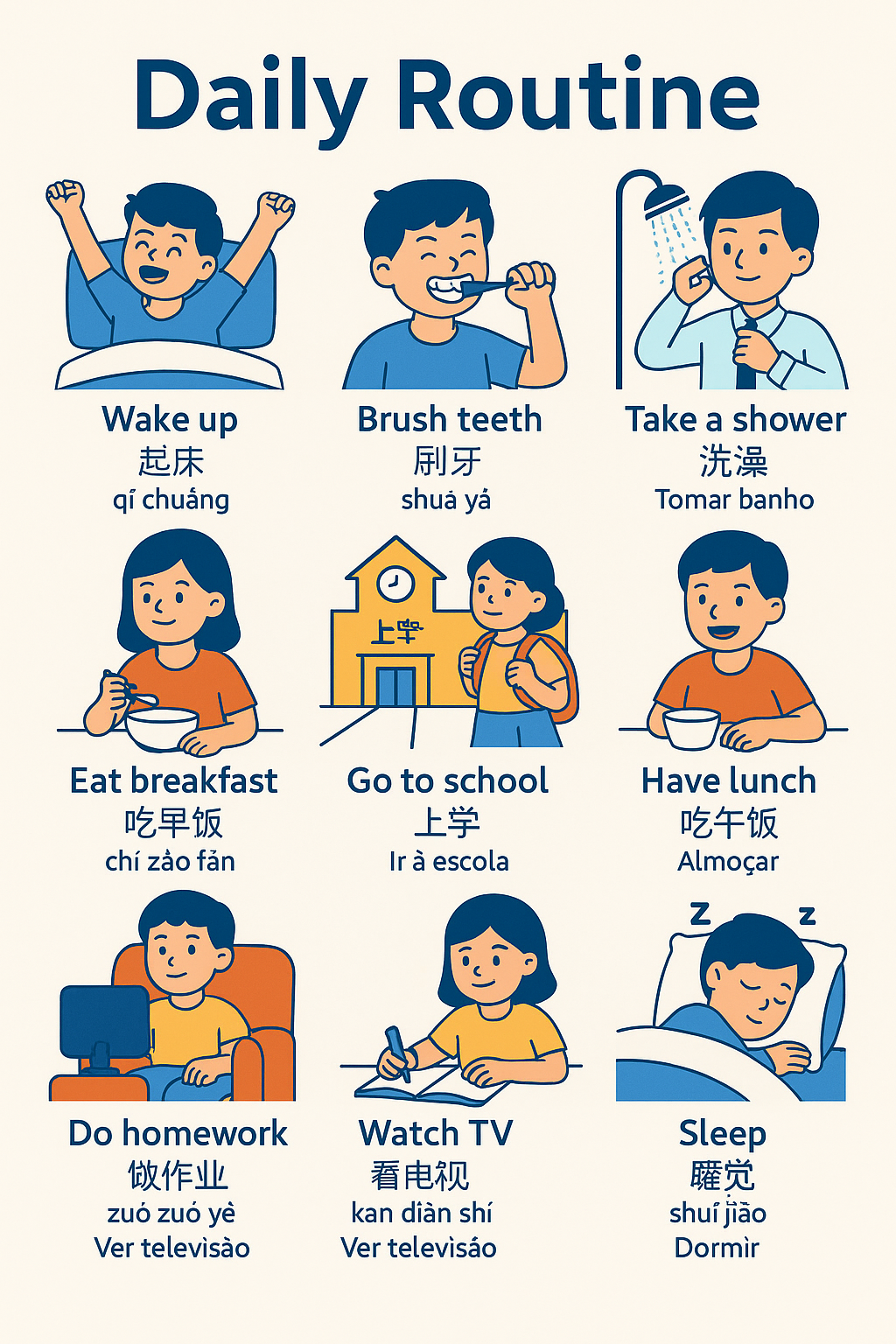🔤 Trilingual: English | 中文 (Mandarin) | Português
📘 Level: Beginner
📅 Topic: Describing Daily Activities
🖼️ Includes image at the end
🎯 Objectives / Objetivo / 目标
By the end of this lesson, you will:
✔️ Describe your daily routine in English, Chinese, and Portuguese
✔️ Use action verbs like wake up, eat, study, go to work
✔️ Practice time expressions and daily activities
✔️ Understand word order in each language
✔️ Boost vocabulary with a clear multilingual chart
📖 1. English Explanation (Main Focus)
Talking about your daily routine helps you describe your life, habits, and schedule to others. It’s also one of the first topics you’ll use in conversations.
🧩 Key Vocabulary & Structure:
-
I wake up at 7 a.m.
-
I take a shower.
-
I eat breakfast.
-
I go to work.
-
I come back home.
-
I go to bed at 10 p.m.
🕘 Time Expressions:
-
in the morning
-
at night
-
every day
-
usually
-
sometimes
🧱 Grammar Tip:
English uses Subject + Verb + Object + Time
👉 I eat lunch at noon.
👉 She studies in the evening.
🈶 2. Mandarin Chinese 中文讲解
谈论每日生活是学习中文的重要部分之一。你可以用它来介绍自己的习惯、工作和日常安排。
🧩 关键词汇 (Key Vocabulary):
| 中文 (Hanzi) | 拼音 (Pinyin) | English | Português |
|---|---|---|---|
| 起床 | qǐchuáng | get up | levantar-se |
| 吃早饭 | chī zǎofàn | eat breakfast | tomar café da manhã |
| 上班 | shàngbān | go to work | ir trabalhar |
| 学习 | xuéxí | study | estudar |
| 回家 | huíjiā | return home | voltar para casa |
| 睡觉 | shuìjiào | sleep/go to bed | dormir |
🕒 时间表达 (Time Phrases):
-
早上 (zǎoshang) – morning
-
中午 (zhōngwǔ) – noon
-
晚上 (wǎnshang) – evening
-
每天 (měitiān) – every day
🧱 语法结构 (Grammar):
Chinese often follows Subject + Time + Verb + Object
👉 我早上七点起床。 (I get up at 7 a.m.)
👉 她晚上十点睡觉。 (She goes to bed at 10 p.m.)
🇵🇹 3. Explicação em Português
Falar sobre a sua rotina diária ajuda a descrever seus hábitos e estilo de vida. É um dos primeiros temas em qualquer idioma.
🧩 Vocabulário-chave:
| Português | Inglês | Mandarim | Pinyin |
|---|---|---|---|
| Acordar | Wake up | 起床 | qǐchuáng |
| Tomar banho | Take a shower | 洗澡 | xǐzǎo |
| Comer | Eat | 吃饭 | chīfàn |
| Estudar | Study | 学习 | xuéxí |
| Trabalhar | Work | 上班 | shàngbān |
| Dormir | Sleep | 睡觉 | shuìjiào |
🕘 Expressões de tempo:
-
de manhã
-
à tarde
-
à noite
-
todos os dias
-
às vezes
🧱 Estrutura da frase:
Português usa: Sujeito + Verbo + Complemento + Tempo
👉 Eu acordo às sete da manhã.
👉 Ela estuda à noite.
🧠 4. Vocabulary Chart (Trilingual Table)
| Activity | English | 中文 (Mandarin) | Pinyin | Português |
|---|---|---|---|---|
| Wake up | Wake up | 起床 | qǐchuáng | Acordar |
| Take a shower | Take a shower | 洗澡 | xǐzǎo | Tomar banho |
| Eat breakfast | Eat breakfast | 吃早饭 | chī zǎofàn | Tomar café da manhã |
| Go to school | Go to school | 上学 | shàngxué | Ir à escola |
| Study | Study | 学习 | xuéxí | Estudar |
| Go to work | Go to work | 上班 | shàngbān | Ir trabalhar |
| Return home | Come back home | 回家 | huíjiā | Voltar para casa |
| Sleep | Go to bed | 睡觉 | shuìjiào | Dormir |
🗣️ 5. Sample Dialogue / Diálogo / 对话
English:
A: What time do you wake up?
B: I usually wake up at 6:30 a.m. and take a shower.
A: Do you work or study?
B: I study in the morning and work in the afternoon.
中文:
A: 你几点起床?(Nǐ jǐ diǎn qǐchuáng?)
B: 我通常早上六点半起床,然后洗澡。(Wǒ tōngcháng zǎoshang liù diǎn bàn qǐchuáng, ránhòu xǐzǎo.)
A: 你工作还是学习?(Nǐ gōngzuò háishì xuéxí?)
B: 我早上学习,下午工作。(Wǒ zǎoshang xuéxí, xiàwǔ gōngzuò.)
Português:
A: A que horas você acorda?
B: Eu normalmente acordo às 6:30 e tomo banho.
A: Você trabalha ou estuda?
B: Eu estudo de manhã e trabalho à tarde.
✍️ 6. Writing Practice / Prática de Escrita / 写作练习
📝 Write a short paragraph about your daily routine in the three languages:
-
English: I wake up at 7 a.m. I brush my teeth, take a shower, and eat breakfast. I go to school at 8 a.m. In the afternoon, I study and play. At night, I sleep at 10 p.m.
-
中文: 我早上七点起床。我刷牙、洗澡、吃早饭。八点我去上学。下午我学习和玩。晚上十点我睡觉。
-
Português: Eu acordo às 7h. Escovo os dentes, tomo banho e tomo café. Vou para a escola às 8h. À tarde, eu estudo e brinco. À noite, durmo às 22h.
🧩 7. Quiz (3 Idiomas)
1. Translate: “I go to work at 9 a.m.”
→ Chinese: _______________
→ Portuguese: _______________
2. What is “study” in Mandarin?
→ _______________
3. Write this in English: “Eu durmo às 10 da noite.”
→ _______________
4. Fill the gap: 他早上七点___。 (He wakes up at 7 a.m.)
→ _______________
